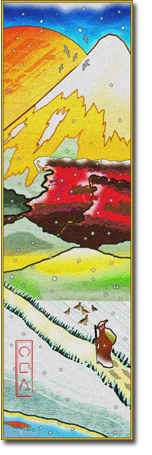On The Way: The Daily Zen Journal
On the Transmission of Mind – Part 4
Huang-Po (d. 850)

People are often hindered by environmental phenomena from perceiving Mind, and by individual events from perceiving principles; so they often try to escape from environmental phenomena in order to still their minds, or to obscure events in order to retain their grasp on principles.
They do not realize that this is merely to obscure phenomena with Mind, events with principles. Just let your minds become void and environmental phenomena will void themselves; let principles cease to stir, and events will cease stirring of themselves. Do not employ Mind in this perverted way. (To force the mind to blot out phenomena shows ignorance of the identity of one with the other.)
Many people are afraid to empty their minds lest they may plunge into the Void. They do not know that their own Mind is the Void. The ignorant eschew phenomena but not thought; the wise eschew thought but not phenomena.
The Bodhisattva’s mind is like the Void, for s/he relinquishes everything and does not even desire to accumulate merits. There are three kinds of relinquishment. When everything inside and outside, bodily and mental, has been relinquished; when, as in the Void, no attachments are left; when all action is dictated purely by place and circumstance; when subjectivity and objectivity are forgotten—that is the highest form of relinquishment.
When, on the other hand, the Way is followed by the performance of virtuous acts; while, on the other hand, relinquishment of merit takes place and no hope of reward is entertained–that is the medium form of relinquishment.

When all sorts of virtuous actions are performed in the hope of reward by those who, nevertheless, know of the Void by hearing the Dharma and who are therefore unattached– that is the lowest form of relinquishment.
The first is like a blazing torch held to the front which makes it impossible to mistake the path; the second is like a blazing torch held off to one side, so that it is sometimes light and sometimes dark; the third is like a blazing torch held behind, so that pitfalls in front are not seen.

Thus, the mind of the Bodhisattva is like the Void, and everything is relinquished by it. When thoughts of the past cannot be taken hold of, that is relinquishment of the past. When thoughts of the present cannot be taken hold of, that is relinquishment of the present. When thoughts of the future cannot be taken hold of, that is relinquishment of the future.
This is called utter relinquishment of Triple Time. Since the Tathagata entrusted Kasyapa with the Dharma until now, Mind has been transmitted with Mind, and these Minds have been identical. A transmission of Void cannot be made through words.
A transmission in concrete terms cannot be the Dharma. Thus Mind is transmitted with Mind and these Minds do not differ. Transmitting and receiving transmission are both a most difficult kind of mysterious understanding, so that few indeed have been able to receive it. In fact, however, Mind is not Mind and transmission is not really transmission.*

Huang-Po (d. 850)
*This is a reminder that all terms used in Zen are mere makeshifts. (footnote of the author John Blofeld 1958)
Excerpted from The Zen Teaching of Huang-Po -On the Transmission of Mind trans by John Blofeld





“Many people are afraid to empty their minds lest they may plunge into the Void. They do not know that their own Mind is the Void.”
In each reading, there will be a phrase, or several, which stand out for you. Sometimes they carry over into your meditation practice; sometimes they are like koans you can’t seem to let go of. You hit the wall of unknowing which stops the mind.
These ancient teachings reach us across hundreds of years shaking us up to experience “don’t know” mind. This is more real, in truth than the mind that thinks it comprehends or has experienced what the teacher is communicating. Instead of trying to escape “don’t know” mind, we can choose to cozy up to it and relax into it.
These are powerful writings. What in this piece has spoken most clearly to you?
Walking the path with you,
Elana, Scribe for Daily Zen